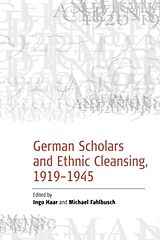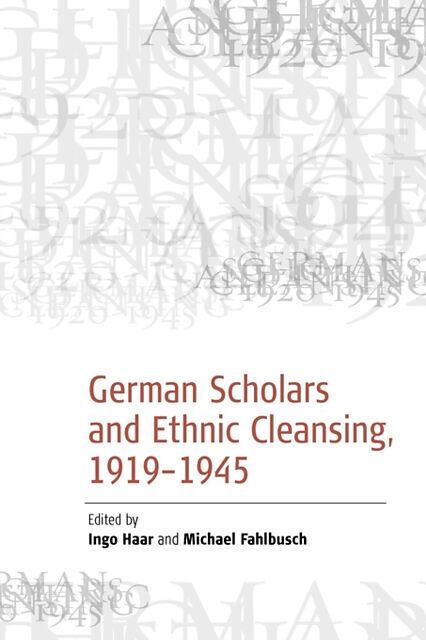German Scholars and Ethnic Cleansing, 1919-1945
Einband:
Kartonierter Einband
EAN:
9781845450489
Untertitel:
1919 - 1945
Autor:
Michael Haae, Ingo Fahlbusch
Herausgeber:
Berghahn Books
Anzahl Seiten:
322
Erscheinungsdatum:
19.01.2006
ISBN:
1845450485
Informationen zum Autor Michael Fahlbusch lives in Switzerland. He studied Geography in Münster and Zürich. He has written on the history of science, ethnic cleansing and ethno-politics in 20th-century Europe. Klappentext CHOICE OUTSTANDING BOOK OF THE YEAR 2005Recently, there has been a major shift in the focus of historical research on World War II towards the study of the involvements of scholars and academic institutions in the crimes of the Third Reich. The roots of this involvement go back to the 1920s. At that time right-wing scholars participated in the movement to revise the Versailles Treaty and to create a new German national identity. The contribution of geopolitics to this development is notorious. But there were also the disciplines of history, geography, ethnography, art history, archeology, sociology, and demography that devised a new nationalist ideology and propaganda. Its scholars established an extensive network of personal and institutional contacts. This volume deals with these scholars and their agendas. They provided the Nazi regime with ideas of territorial expansion, colonial exploitation and racist exclusion culminating in the Holocaust. Apart from developing ideas and concepts, scholars also actively worked in the SS and Wehrmacht when Hitler began to implement its criminal policies in World War II.This collection of original essays, written by the foremost European scholars in this field, describes key figures and key programs supporting the expansion and exploitation of the Third Reich. In particular, they analyze the historical, geographic, ethnographical and ethno-political ideas behind the ethnic cleansing and looting of cultural treasures.Michael Fahlbusch lives in Switzerland. He studied Geography in Münster and Zürich. He has written on the history of science, ethnic cleansing and ethno-politics in 20th-century Europe. Ingo Haar is working as a Research Fellow in the Berlin Centre of Research on Anti-Semitism (Zentrum für Antisemitismusforschung, Berlin). He was a member of the Austrian Historical Commission on History of National Socialism and has worked extensively on policies and ideology of the Third Reich. Zusammenfassung Written by the foremost European scholars! this collection of essays describes key figures and key programs supporting the expansion and exploitation of the Third Reich. It also analyzes the historical! geographic! ethnographical and ethno-political ideas behind the ethnic cleansing and looting of cultural treasures. Inhaltsverzeichnis Foreword Georg G. Iggers+ Preface Ingo Haar and Michael Fahlbusch List of Abbreviations Chapter 1. German Ostforschung and Anti-Semitism Ingo Haar Chapter 2. The Role and Impact of German Ethnopolitical Experts in the SS Reich Security Main Office Michael Fahlbusch Chapter 3. The Nazi Ethnographic Research of Georg Leibbrandt and Karl Stumpp in Ukraine, and Its North American Legacy Eric J. Schmaltz and Samuel D. Sinner Chapter 4. Volk, Bevölkerung, Rasse, and Raum: Erich Keyser's Ambiguous Concept of a German History of Population, ca. 1918-1955 Alexander Pinwinkler Chapter 5. Ethnic Politics and Scholarly Legitimation: The German Institut für Heimatforschung in Slovakia, 1941-1944 Christof Morrissey Chapter 6. The Sword of Science: German Scholars and National Socialist Annexation Policy in Slovenia and Northern Italy Michael Wedekind Chapter 7. Romanian-German Collaboration in Ethnopolitics: The Case of Sabin Manuila Viorel Achim Chapter 8. Palatines All Over the World: Fritz Braun, a German Emigration Researcher in National Socialist Population Policy Wolfgang Freund Chapter 9. German Westforschung, 1918 to the Present: The Case of Franz Petri, 1903-1993 Hans Derks Chapter 10. Otto Scheel: National Li...
Autorentext
Michael Fahlbusch lives in Switzerland. He studied Geography in Münster and Zürich. He has written on the history of science, ethnic cleansing and ethno-politics in 20th-century Europe.
Klappentext
CHOICE OUTSTANDING BOOK OF THE YEAR 2005 Recently, there has been a major shift in the focus of historical research on World War II towards the study of the involvements of scholars and academic institutions in the crimes of the Third Reich. The roots of this involvement go back to the 1920s. At that time right-wing scholars participated in the movement to revise the Versailles Treaty and to create a new German national identity. The contribution of geopolitics to this development is notorious. But there were also the disciplines of history, geography, ethnography, art history, archeology, sociology, and demography that devised a new nationalist ideology and propaganda. Its scholars established an extensive network of personal and institutional contacts. This volume deals with these scholars and their agendas. They provided the Nazi regime with ideas of territorial expansion, colonial exploitation and racist exclusion culminating in the Holocaust. Apart from developing ideas and concepts, scholars also actively worked in the SS and Wehrmacht when Hitler began to implement its criminal policies in World War II. This collection of original essays, written by the foremost European scholars in this field, describes key figures and key programs supporting the expansion and exploitation of the Third Reich. In particular, they analyze the historical, geographic, ethnographical and ethno-political ideas behind the ethnic cleansing and looting of cultural treasures. Michael Fahlbusch lives in Switzerland. He studied Geography in Münster and Zürich. He has written on the history of science, ethnic cleansing and ethno-politics in 20th-century Europe. Ingo Haar is working as a Research Fellow in the Berlin Centre of Research on Anti-Semitism (Zentrum für Antisemitismusforschung, Berlin). He was a member of the Austrian Historical Commission on History of National Socialism and has worked extensively on policies and ideology of the Third Reich.
Zusammenfassung
Written by the foremost European scholars, this collection of essays describes key figures and key programs supporting the expansion and exploitation of the Third Reich. It also analyzes the historical, geographic, ethnographical and ethno-political ideas behind the ethnic cleansing and looting of cultural treasures.
Inhalt
Foreword
Georg G. Iggers+ Preface
Ingo Haar and Michael Fahlbusch List of Abbreviations Chapter 1. German Ostforschung and Anti-Semitism
Ingo Haar Chapter 2. The Role and Impact of German Ethnopolitical Experts in the SS Reich Security Main Office
Michael Fahlbusch Chapter 3. The Nazi Ethnographic Research of Georg Leibbrandt and Karl Stumpp in Ukraine, and Its North American Legacy
Eric J. Schmaltz and Samuel D. Sinner Chapter 4. Volk, Bevölkerung, Rasse, and Raum: Erich Keyser's Ambiguous Concept of a German History of Population, ca. 1918-1955
Alexander Pinwinkler Chapter 5. Ethnic Politics and Scholarly Legitimation: The German Institut für Heimatforschung in Slovakia, 1941-1944
Christof Morrissey Chapter 6. The Sword of Science: German Scholars and National Socialist Annexation Policy in Slovenia and Northern Italy
Michael Wedekind Chapter 7. Romanian-German Collaboration in Ethnopolitics: The Case of Sabin Manuila
Viorel Achim Chapter 8. Palatines All Over the World: Fritz Braun, a German Emigration Researcher in National Socialist Population Policy
Wolfgang Freund Chapter 9. German Westforschung, 1918 to the Pre…

Leider konnten wir für diesen Artikel keine Preise ermitteln ...
billigbuch.ch sucht jetzt für Sie die besten Angebote ...
Die aktuellen Verkaufspreise von 6 Onlineshops werden in Realtime abgefragt.
Sie können das gewünschte Produkt anschliessend direkt beim Anbieter Ihrer Wahl bestellen.
Loading...
Die aktuellen Verkaufspreise von 6 Onlineshops werden in Realtime abgefragt.
Sie können das gewünschte Produkt anschliessend direkt beim Anbieter Ihrer Wahl bestellen.
| # | Onlineshop | Preis CHF | Versand CHF | Total CHF | ||
|---|---|---|---|---|---|---|
| 1 | Seller | 0.00 | 0.00 | 0.00 |
